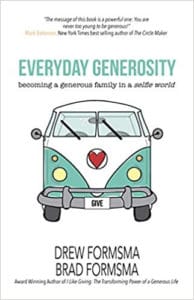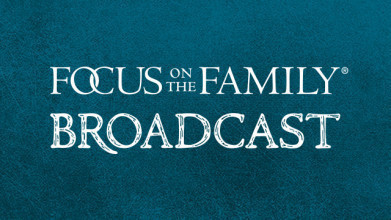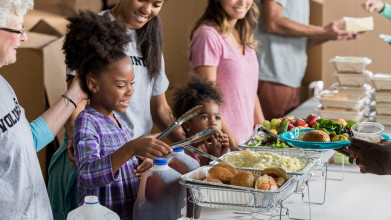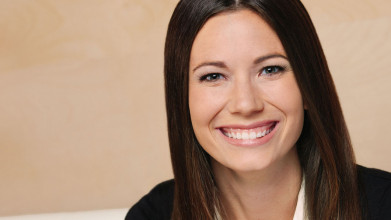Brad Formsma: The creator of the universe works through us to be a part of answering prayer. But I would submit we have to have our antennae working and we have to be looking and listening for those opportunities.
John Fuller: That’s really good insight. And we’re gonna hear more today about meeting the needs of those around us, of others. Uh, thanks for joining us. This is Focus on the Family with your host, Focus president and author Jim Daly, and I’m John Fuller.
Jim Daly: You know, the Bible contains many, many verses about being generous with what God has given us. Here’s just one example from the New Testament, 1st John 3:17, “If anyone has material possessions and sees a brother or sister in need but has no pity on them, how can the love of God be in that person?”
John: Mm-hmm. That’s good and a little challenging too.
Jim: (laughs) Yeah it is, and that’s just one of the verses that inspired today’s guest, Brad Formsma, to make a career out of inspiring others to be more generous with their time and attention as a way demonstrating God’s love. Brad is the founder of an organization called I Like Giving and hosts a leadership podcast called The WOW Factor.
John: Mm-hmm. And here’s Brad Formsma. And toward the end of the message, we’ll also hear from his son, Drew, as they were speaking at Calvary Church Albuquerque on today’s Focus on the Family.
Brad: Well, we’re gonna have some fun talking about the generous life today. I’ve been studying the generous life for over 13 years. And, uh, three things in particular I wanna share with you about how its impacted me and my family. And I think it’s things that were, they’re transformational. You’ll be able to put ’em into practice today, tomorrow, next week, and so on. Um, but before we jump into that, I thought I would give you a little backstory. Um, I was four, five years old and my grandpa had a bakery. And so he’d like to make these small loaves of bread on Saturday morning. And so he picked me up and there we are, fresh bread, I mean, it was a really good way to spend a Saturday morning.
And then when I was about 11, he picked me up, he’s a big Dutch guy, he said, “Bradley, I’m gonna pick you up. We’re gonna go to the office and bake some more bread.” This time, he had a larger commercial baking company, but yet his test kitchen was still there. And so 16 loaves of bread came out of the oven and I’m thinking, “This is gonna be another one of those Saturday morning, fresh bread, it’s gonna be awesome. Bread, Brad, grandpa, perfect.” But those loaves cooled down and into the trunk they went. And our first stop was to a widow from his church. And he gave her a couple of loaves of bread, and he was giving her affirming and kind words. So he’s modeling generosity of words.
And then the next stop was two more loaves of bread and this time, there was a white envelope w- with those loaves of bread and he was modeling generosity of money. And as the morning went on, he showed me generosity of time and sharing his stuff and his attention. And so grandpa early on modeled these things for me. So generosity of thoughts. Boy, this is an interesting one. You know, the Bible talks about loving your neighbors, yourself, and yet sometimes my thoughts of myself aren’t that great. I actually kinda feel bad for my neighbor.
Audience: (laughs).
Brad: And, uh, (laughs) and other times, I just don’t think positively of someone. I don’t give someone the benefit of the doubt and people are like, “Oh, that’s not fair, you can’t say it.” Well, I just did. So the idea of-
Audience: (laughs).
Brad: … what do we think about when we think about others and ourself? Are we generous? And then generosity of words. Boy, that’s a big one. We can, uh, cut people down with our words. We can build people up. It’s a powerful way. Every day, we can be generous. And then generous with our money. That’s such an important thing. It softens our heart. Every time I give, I become more like Jesus and I take the focus off of Brad and put it onto someone else. And then this idea of being generous with influence. I, I wouldn’t be where I am today if people didn’t connect me or introduce me to someone else. And we all have some influence, spheres of influence.
Some of us have big companies, some of us have small companies, some of us have just our family that we’re involved with. We can help be generous with our influence. And then generosity of time. That’s a big one. You guys have this huge event coming up in June where you’re looking to have 8,000 hours of giving of your time to help serve the local community here. Big, big way to be generous. And then generosity of attention. Oh, my word, this one has wrecked me. I wish I only had six ways to live generously (laughs) because this one, I’m just not doing a good job at it. You know, the other day I was at this little gathering and I was having this conversation with this person.
And my eyes kept drifting over their shoulder to somebody else that I wanted to catch up with. I know none of you have ever done this, but it was like, uh, and I kept think- I could feel that person feel my lack of being generous. And I’m like, “What a ding-a-ling. Here I’m just talking about this and I’m, I’m doing it.” And then I go to dinner that night with my wife and we’re on a date and I’m looking around the restaurant, I’m like, “Look at all these people that are paying a lot of money to be at dinner to go with their cellphone.” And then I realized I was looking at mine.
Audience: (laughs).
Brad: And (laughs) I’m like, “I have this five or six ounce piece of plastic and glass and technology in my pocket, it’s like the anti-generosity attention thing. And yet can we all not stop and think for a minute of the times that we have felt someone being fully present with us?” Boy, I think that’s a powerful way of being generous. So, I’m a recovering person in that area, for sure. But I would just say, you know, be aware of that one. And then the idea of sharing our stuff. Sometimes we have things that we don’t even realize would be helpful for someone else to share. And we all have our different ideas of what’s appropriate to share, but, um, you know, just saying we…
One time, this guy says to me… Well, um, I got a new car. My neighbor came over and he wanted to borrow my other car, but I was trying to sell it and, like, you know, “What if he scratched it?” And I’m like, “Well, whose car is it? Oh, that’s not fair, I know it’s all God’s.” So (laughs), you know, we have these ideas of what we share and how we can help other people. So the first thing I would share with you is the idea of awareness. So, when I would get my antenna working, like, grandpa was always encourage me to get my antenna working. My son told me the other day, “Dad, you need to explain to people under 30 what an antenna is.”
Audience: (laughs).
Brad: But you guys know the idea, it’s, hey, I’m looking, I’m listening for ways to be generous in one of these seven ways. So, I would take you to a passage in Galatians, um, read it here, Galatians 6, Paul says, “Therefore, as we have opportunity, let us do good to all people, especially those who belong to the family of believers.” You know, we get, we get to give for our family, um, we… I read this newspaper article about a Sudanese father and son who were firebombed out of their village. They lost friends, they lost family. And, uh, as I read further, I realized that the dad had, uh, a bike. That’s how he got to work. And the, um, the son had a, a bike and that was his toy.
And it was basically their earthly possessions. They had ended up in Michigan. And as I read further, I realized that, um, someone had stolen their bikes. I’m like, “That’s terrible.” So, I said to my kids, ’cause I read the article out loud, “What should we do?” And they’re like, “We gotta go get ’em bikes.” And I’m like, “You’re right, we gotta go get ’em bikes.” So we jumped in our van, went to the bike store, loaded ’em in the back of the van. And this is probably where I should tell you a little bit about my marriage. I’m the ready, fire, aim activator guy and my wife’s the planner. So as we rolled up to that first intersections with two new bikes in the back of the van, she looks over and says, “Where do they live?”
Audience: (laughs).
Brad: Well, of course they don’t put the address in the (laughs) newspaper.
Audience: (laughs).
Brad: So, we spent four hours all over our city looking for these people, but we found ’em. And when we did, all the dad could say is, “I like bike, I like bike,” as he’s driving across the, the street. And we got in the car and that day my wife was like, “You know, we had our antennae working. You know, what your grandpa taught you. You know, it’s, it, it came our way. I think God had an assignment for us.” And I think God has an assignment for all of us to become aware and help other people. And I must’ve told my buddy, Scott, this I-like-bike story because one day he texted me, “I like cavities.” I’m like, “What are you talking about?” I knew he wasn’t a dentist and I’m clearly not one-
Audience: (laughs).
Brad: And, uh, he says, “Well, you know, I was at the dentist’s office and I overheard a single mom say, ‘$926. I, I can’t do it. Can I make payments?’” And he said, “You know me, Brad, like, I, I’m introverted. I, I don’t even know if I like people.”
Audience: (laughs).
Brad: (laughs). But he’s like, “I kept hearing, ‘I like bike,’ in my head. So I jumped up and I went up to her and I said, ‘Ma’am, would you forgive me, would you forgive me for eavesdropping? I just wanna take care of that for you.’” And he handed his credit card to the cashier. When I’m with Dave Ramsey, I say, “Debit card.” He likes that.
Audience: (laughs).
Brad: And he said tears flew, rolled down her face. He said, “I thought about that passage in Galatians where we bury each others’ burdens.” But he said, “I don’t think I would’ve done it if it wasn’t that crazy bike story because you gave me an idea of looking and listening outside of, you know, other areas of my life.” Awareness, get that antenna working. We get to give. Second thing is the idea of action. There’s a passage in Proverbs, I love this passage, “A generous person will prosper, whoever refreshes others will be refreshed.” I have a, a friend who’s old. Now, I say old because he’s 104. And he decided in the 60s to start giving half of his money away and see what would happen.
So when we talk about these benefits of giving, the first benefit that I would tell you is the idea of laying out for yourself treasure in heaven, sending it ahead. And he always says, “Well, I just give it to the bank account of heaven.” And I love that picture, you know, you drive down the streets here, you see bank account of Albuquerque. You don’t really see bank account of heaven. But he said, “It’s really nice ’cause all the money I’ve ever given, I never have to worry about it going down in value. Don’t have to even check it. I don’t have to go meet with that investment advisor. I’ve sent it ahead.” And I just love that picture how he does that. And I think the second benefit is the idea of health.
And this isn’t, “I give to get healthy,” but my friend, Stephen Post, wrote this book Why Good Things Happen to Good People. And they spend millions of dollars through a gift from the Templeton Foundation to figure out what’s the connection with generosity and health? And they realized that people that are three times a week, generous, in some of these way we talked about, they live 10 years longer, they take half the medicine, and that’s just scratching the surface of the benefits. It’s really quite an outstanding thing to think about.
John: You’re listening to Brad Formsma on today’s episode of Focus on the Family. And you can get the book he wrote along with his son, Drew, it’s called Everyday Generosity. Uh, we’re sending that as our thank you gift when you make a contribution of any amount to Focus on the Family. Call 800, the letter A, and the word FAMILY, or stop by focusonthefamily.com/broadcast. Let’s go ahead and hear more now from Brad Formsma.
Brad: And then the third benefit, of course, there’s many, but I just, for this morning’s time’s sake, third one is the idea of relationship. You know, uh, have you ever said something like this, “Oh, you’ve got to meet so-and-so, they’re the sweetest couple, they’re so stingy, we love ’em”? And what happens is-
Audience: (laughs).
Brad: … you, you need to go out to dinner with them ’cause it’s a great experience because what happens is you sit there and it’s uncomfortable the whole time ’cause they’re thinking, “Am I gonna have to pay?” And they probably brought you to a place already that the prices aren’t so high, then when the check comes, you know, they just kinda look at it and it gets really weird, and you know. Have you ever done that about anybody? No, you’ve never done that, but you often will say, “You know, you gotta meet so-and-so. They are so generous. They’re so kind. Oh, she is, she’s always serving. You know, he, he does this. Oh, I, I, uh…” Th- that’s how it goes.
And you find that you’re drawn to generous people. So when you’re generous, you, you find that your relationships in life are better. And because we were created for relationship with God and others, that all make sense. We’re made in his image, so the idea of benefit, of relationship. I, our family, we love to regularly give and we’ve made the decision to give first and, uh, that’s, you know, important to us. And, uh, it’s so important that I’m gonna tell you one of my most embarrassing stories, um, around not being generous for a season and it was, uh, my wife thought I was regularly giving to our church and I thought she was regularly giving to our church.
And so, uh, you know what happens when th- that happens? No giving to church (laughs). So one day, we’re like, “Oops, missed on that one.” So we did that online deal where you can kinda sign up and put your checking account number in it. And it’s just helped us knowing we regularly give that way as a beginning place. And so if that works for you, and my silly story here, I’m supposed to be the giving guy and I whiffed on that one for a period of time. But you know what? God’s not about a duty on this. We get to give. He loves us. He wants us to experience joy in giving and it’s good for us when we, when we give. Um, and we also created like an emergency giving fund, we call it in our family, where we just made some spending decisions so there’d be a little bit of money left over that would, we could go do crazy adventures like the bikes.
And one day, our son came to us and he said, “My friend has found out his dad has two months to live and, uh, you know, could we do something?” And so we made a decision to talk as a family because we can’t solve every opportunity, but it gives us a chance to be together to talk, and then to pray and see how God leads it. And so we decided this is a perfect prepaid visa card kinda deal because, well, sure they have expenses that we don’t know about, so we’ll just send that to ’em and we did and sadly, that doctor was right, a couple, couple of months later, um, that man passed aways. And a note came to us three weeks after he passed away from his wife.
And it said, “Dear Brad and Laura, uh, my husband Tom was pacing back and forth in our living room asking God to provide money to put new tires on my car for those Michigan winters before he died and went to heaven.” The creator of the universe works through us to be a part of answering prayer. But I would submit we have to have our antennae working and we have to be looking and listening for those opportunities. And what I didn’t tell you is six months before this, I went to a doctor’s office and found out that I had a rare form of leukemia. I was told I had two years to live without, um, uh, expensive drugs that might work. And, uh, my whole life flashed before my eyes.
And I would suspect that you’ve had your life flash before your eyes. And, and if you haven’t you, you will. And in those moments, it’s a chance to go to, “Where’s my hope?” And my hope’s in the Lord. And yet I’m still on this earth and I have a young family to take care of and so I started thinking, “Who’s gonna take care of them and who’s gonna walk my daughter down the aisle?” And, um, fear begins to kinda wash over you and I thought back to that tire story and I thought, “Had we not made that early decision to wanna aim at living generously, I think I woulda chickened out.” Outta just fear. And yet, through that gift, I think there was healing because I was able to be focused on someone else’s situation and not my own.
And then we get to bring these seven ways with us when the storms of life hit and the clouds of life are over us. And so, you know, for me, that’s, uh, looks a lot like driving up to UCLA, uh, Ronald Reagan Medical Center, I live in Southern California now, and so you go up there and they take all this blood and money from you.
Audience: (laughs).
Brad: And, and one day, (laughs) this lady, her name’s Joy, and she’s having a bad day and-
Audience: (laughs).
Brad: … and I’m like, not only… Okay. Have you ever noticed some people have the wrong name for the job?
Audience: (laughs).
Brad: I mean, Joy, she’s taking blood all day from people, poking people and she’s in a bad mood. And then I wandered down the hallway and I have to see my doctor and he’s a piece of work. And that’s generous with my words.
Audience: (laughs).
Brad: I mean, this guy knows everything. Just ask him. And we’re talking about… Oh, man.
Audience: (laughs).
Brad: We’re talking about my situation and he says, um, “Well, what are you thinking about?” And I said, “I’m trusting God for a miracle. That he’s gonna heal me.” He goes, “I like your shoes.”
Audience: (laughs).
Brad: We went from miracles to shoes. And then he’s talking about the buckle. I, I wore ’em for you today.
Audience: (laughs).
Brad: And then he goes to the stitching and I’m like, “Now, it’s just weird. This is crazy.” So I said, “What are yours like, size 10?” “Oh, you think you’re so smart. They’re nine and a half.”
Audience: (laughs).
Brad: And I’m like, “You’re so dumb, you just gave me the answer.” So I go to Nordstrom Rack.
Audience: (laughs).
Brad: So I’m like, “I’m gonna go back to there.” So I went back and I found a pair of nine and a halves, so I bought ’em for him (laughs).
Audience: (laughs).
Brad: I went back to my house, and I wrote this note out.
Audience: (laughs).
Brad: I said, um, “Dear, Doc, thank you for using your God-given gifts to help a guy like me stay around a little longer.” And then I, I think Jesus is okay with this second part, it’s a little snarky, but I will find out (laughs).
Audience: (laughs).
Brad: I said, “These will help you be one step more like me.”
Audience: (laughs).
Brad: (laughs). And then he ca- so he calls me up, he’s like, “I read your book, you’re crazy. You think a generous world is a better world for all of us.” And I said, “I do.” “You’re crazy.” How many of you believe a generous world is a better world for all of us, right? Absolutely. Yeah. We’re all in this together. So we get to bring the generous life to these situations. And I don’t get it right every time. Some days I’m up there and I’m feeling sorry for myself, but you know what? I’m better when I’m generous. And I think we all can step in in these areas. So when I think about impact, I also think about our own family. And I have m- my 17-year-old son with me today. He’s going on 27, so it makes interesting parenting challenge. I asked him to share some thoughts. So would you welcome Drew Formsma?
Drew Formsma: Hello, Calvary. Whoo, it is good to be here. Today, I wanna share with you what’s it been like for me being around the generosity conversation and what’s it been like being in a family that embraces it and the impact it’s had on my friends. I’ll take you back. I was in the back of the bus headed to golf one day and my friends were starting to poke fun at this kid that had a disability. And I sat there and didn’t say anything. And I got off the bus that day and saw it disappear in the distance. And I thought to myself, “Man, that was a missed opportunity. I shoulda stuck up for him and shoulda said something.” Fast-forward two months, it was my first day at high school and all these thoughts are going through my head, “Am I gonna make friends? Are there any cute girls?-
Audience: (laughs)
Drew: … Am I gonna get good grades?” And then the thought of that kid came into my mind. And I felt like God put him on my heart and said, “Look out for someone like that. In high school, change your ways. Instead of looking to your own needs, look to the people around you. Take the spotlight off of Drew and onto the people that are all around you.” And I thought, “Man, I can do this.” And so I’m like, “Okay, God, I’m ready.” And so I’m looking around and this kid right next to me about this tall, thick glasses, and so I’m like, “God, here he is.” So I walk over to him. I’m like, “Hey, I’m Drew.” And he’s like, “Hey, I’m Tim.” And then it got awkward. I’m like, “No.” (laughs). And when I’m in an awkward circumstance, I tell a joke. So I’m like, “Hey, Tim, why did the golfer have two pairs of pants?” He’s like, “Dude, I have no idea.” I said, “‘Cause he had a hole in one.”
Audience: (laughs).
Drew: (laughs) So weeks after weeks, I kept telling funnier jokes and just kept being a friend, help him with his homework, sit with him at lunch. And then one day, I realized my one decision to step into Tim’s life was affecting my friends because he was walking down the hallway, Tim was, and my friend was walking from the other direction. And my friend put out his hand and said, “Hey, Tim, have a great day.” I realized my one decision to take the focus off of me and use my generous influence, oh, we all have spheres of influence, even at high school, I was able to be generous with my time and influence towards him. And I believe we all have someone in our lives like Tim and we’ve all felt like Tim.
I have parents and grandparents come up to me after speaking many times and ask, “Drew, how do I bring this conversation into my kids’ lives? It’s hard to connect with them, what do I do?” So I was like, “Okay, you asked. I’ll come up an acronym.” So I came up with a acronym, MEE, model, encourage, engage. M- when we model generosity to our kids, they’ll follow. I followed in my parents’ footsteps. My dad followed in his grandpa’s footsteps. I believe that when those seeds are planted, they’re there forever. And then encourage. Encourage your kids to give, but don’t force it. That gets gross, trust me. Don’t go there. Show them why you give and where you give and show them ways they can give.
And then engage. Engage in this conversation. A- around the dinner table, share your stories. A story is so powerful. It is what motivates us into action. I had a kid come up to me at school, he’s like, “Drew, I don’t even know what generosity means.” And I’m like, “I got some work to do.” My generation doesn’t even understand and if they have any idea, they think it’s just about money. But as we, as we’ve learned today, it’s seven ways every day that we can step into. And we get to step in or step out. But we can become aware and step into it. And we all can do this. And I believe that when we start doing this when we’re young, that decision won’t have to be made, we already made it when we were younger and we’ll be living this all our lives. Thank you.
Brad: Okay. Thanks, buddy. Yeah. Good job. Oh, that’s fun. So, uh, I kinda forget about f-, you know, finishing that health story, um, so I, I still take chemotherapy. I’m still believing for a miracle. Um, I y- you know, yes, we have our hope in the Lord and, uh, we’re, I think we’re in many ways in this together. So, you know, the devil wants to knock me out, but I’m not getting knocked out. We’re gonna keep on proclaiming this message, yeah.
John: Well, Brad Formsma went on to pray with his very appreciative audience there at Calvary Church Albuquerque, but unfortunately, we’re running out of time here on Focus on the Family.
Jim: Uh, John, let me just close by saying thanks to Brad and his son, Drew, uh, for letting us share this message today. What a well-spoken young man Drew is. Uh, this is a great reminder for us to have these generosity conversations with our sons and daughters. In our MEE-focused culture, we can help our children develop a more other-centered attitude, especially when times are hard, which gives us a great opportunity to show Christ’s love to others through simple acts of kindness. And let me remind you, if you’re going through a rough patch, uh, Focus on the Family is here for you. Our staff would be happy to take your call, listen to what’s going on, pray with you.
And if you need additional help, they can schedule a callback from one of our caring Christian counselors. And if you can, uh, please give now to help Focus on the Family help other families who are hurting. If you can make a donation of any amount, I’d like to send you the book Everyday Generosity: Becoming a Generous Family in a Selfie World. Uh, the book was written by both Drew and his dad, so it’s definitely something you can read together as a family.
John: Request your copy of Everyday Generosity when you call 800, the letter A, and the word FAMILY, or you can donate online and request that at focusonthefamily.com/broadcast. Next time, teen expert, Dr. Ken Wilgus, explains how to have healthy communication with your teenager.
Dr. Ken Wilgus: Our teenagers have to be prepared and so part of agreeing to disagree includes inviting teenagers into, uh, “What do you think?”
John: On behalf of Jim Daly and the entire team, thanks for joining us today for Focus on the Family. I’m John Fuller inviting you back as we once again help you and your family thrive in Christ.





















